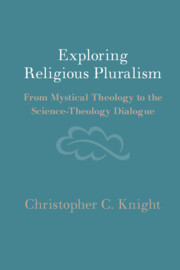Book contents
- Exploring Religious Pluralism
- Exploring Religious Pluralism
- Copyright page
- Epigraph
- Contents
- 1 Introduction
- 2 Apophaticism and Perennialism
- 3 The Philosophy of Religion and Its Limitations
- 4 Philosophy and Noetic Perception
- 5 Philosophy and the Pluralistic Hypothesis
- 6 Beyond Philosophical Argument
- 7 Archetypes and ‘Platonic’ Mysticism
- 8 Noetic Perception and the Role of the Imagination
- 9 The Evolution of Religiosity
- 10 Revelation and Divine Action
- 11 A Pluralistic Model in the Making
- 12 Pluralism or ‘Reciprocal Inclusivism’?
- Afterword
- Bibliography
- Index
2 - Apophaticism and Perennialism
Published online by Cambridge University Press: 14 March 2024
- Exploring Religious Pluralism
- Exploring Religious Pluralism
- Copyright page
- Epigraph
- Contents
- 1 Introduction
- 2 Apophaticism and Perennialism
- 3 The Philosophy of Religion and Its Limitations
- 4 Philosophy and Noetic Perception
- 5 Philosophy and the Pluralistic Hypothesis
- 6 Beyond Philosophical Argument
- 7 Archetypes and ‘Platonic’ Mysticism
- 8 Noetic Perception and the Role of the Imagination
- 9 The Evolution of Religiosity
- 10 Revelation and Divine Action
- 11 A Pluralistic Model in the Making
- 12 Pluralism or ‘Reciprocal Inclusivism’?
- Afterword
- Bibliography
- Index
Summary
The relationship between the perspectives of the perennialist tradition of pluralistic thinking and the kind of apophaticism articulated in the patristic era by Gregory of Nyssa and in the modern era by Vladimir Lossky is examined, and parallels in Islamic thinking are noted. The kind of intuitive apprehension of divine realities associated with the ancient Greek concept of the nous is seen as central to this relationship. The perennialist distinction between esoteric and exoteric aspects of any faith tradition is examined in this context, and Lossky’s sense of the importance of antinomy is seen as significant for rejecting the kind of critique of pluralism that is based on the notion that the doctrinal statements of different faith traditions should be seen as philosophical ‘truth claims’.
Keywords
- Type
- Chapter
- Information
- Exploring Religious PluralismFrom Mystical Theology to the Science-Theology Dialogue, pp. 16 - 35Publisher: Cambridge University PressPrint publication year: 2024

